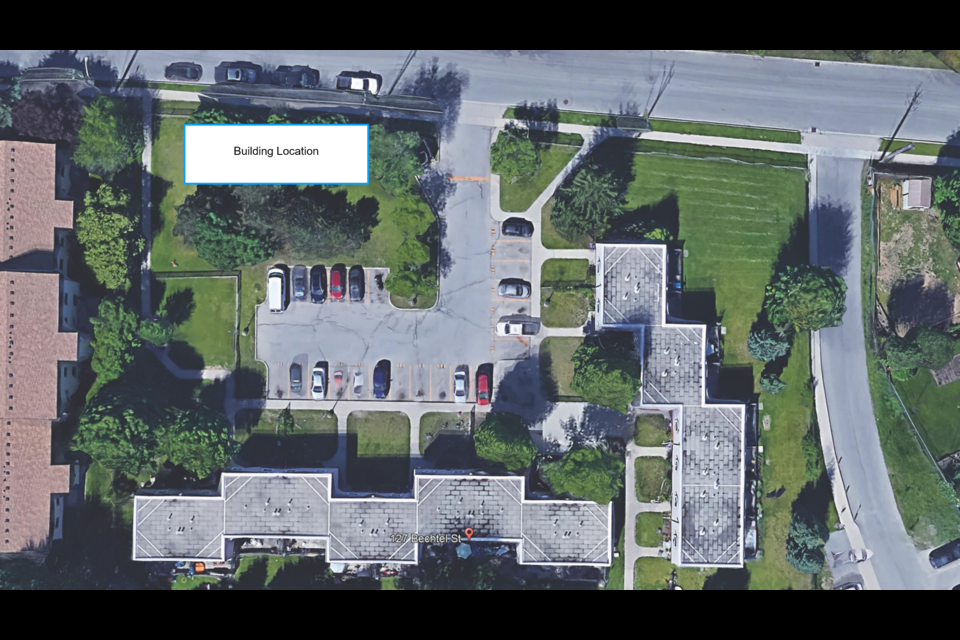Six residents of Waterloo Region will be getting much-awaited affordable housing by the end of this year.
The occupants of the six one-bedroom modular home build planned for Bechtel Street will be selected in September from the region's long waitlist, said Jennifer Murdoch-Martin, manager of housing programs and development.
"There's a large waitlist for affordable housing," she said. "For these types of units (one bedrooms), it can be six to seven years (waiting) in Waterloo Region. The whole waitlist is just over 6,600 households, out of that 1,358 are seniors, and 2.832 households with no dependents."
The structure, said Murdoch-Martin, which is being built with Cambridge's NOW Housing, is an infill project that will serve as a springboard for similar future ventures.
"It was an opportunity to try some alternative forms of housing construction to build quickly to respond to the needs of affordable housing," she said. "Land is one of the issues so infill was useful."
As a first time, Murdoch-Martin said, the project is planned for land owned by the region, however, it will help answer some questions around planning and get the conversation going for the possibility of use of private land for similar modular or tiny homes under the secondary suites/coach house/carriage house form of housing.
"This is setting the stage for this form of construction that can work in our communities to create affordable housing quickly," she said. "We can then redo this format anywhere in Waterloo Region."
The whole project, Murdoch-Martin said, will cost the region up to $2.2 million.
"Generally, you're not going to have savings in this size (build)," she said. "As the buildings get bigger, there are savings.
"There will be savings on the operating side (energy) because it's built efficiently," Murdoch-Martin noted. "There will also be savings in the time you can get to occupancy. I would say we're savings months, compared to traditional construction."
Expediency of construction is definitely one of the positives of such form of housing, said Matthew Lubberts, president, NOW Housing, adding that affordability is the biggest upside of modular homes.
"Our mission and goal is to build affordable housing people can afford to live in," he said, adding he doesn't come from a lot of money and wanted to use shipping containers for emergency or sustainable housing.
Lubberts said his company started building affordable homes using shipping containers four years ago. The company uses newly built shipping containers that make their way to North America, he explained, so they're bought after their first journey.
The current project, Lubberts said, three 20-foot shipping containers for each unit.
"There are three units on the main level and three on the second level," he said. "Two of the main units will be barrier free."
In a modular construction method, the dwelling is put together in the factory and then installed on site, said Lubberts.
"Modular construction is becoming the building form of choice across North America," he said, adding it fits in with his mission to provide sustainable, affordable accommodation that costs less than $300,000.
Expenses for NOW Housing are generally divided into the cost of the container, which currently varies between $120,000 and $160,000 per unit, and has gone up from $70,000 and $100,000 in the last 12 months, said Lubberts. Fitting the container to become a livable unit, he added, costs up to $100,000 per piece.
"We're working with municipalities to be able to put affordable rentals and affordable for-sale homes in the next several years under the $300,000 mark," said Lubberts. "Basically, to land a unit and completely finish it, we're (spending) between $150,000 and $170,000, but there are soft costs, such as engineering, development charges to municipalities, and the cost of land itself. We will hit the $250,000 mark at the end of it, but the goal is to stay under the $300,000 for a good two-bedroom unit to live in."
Currently, Murdoch-Martin said, the additional units on 127-161 Bechtel St. will be rental dwellings, with rents geared to income, with a rent-to-own program for modular homes to be explored at a later date.



